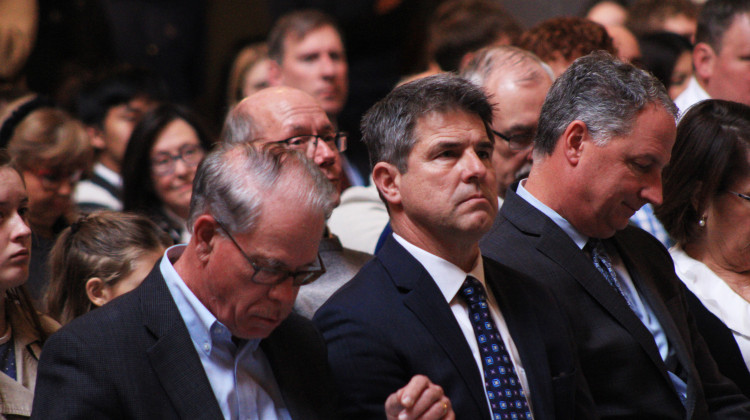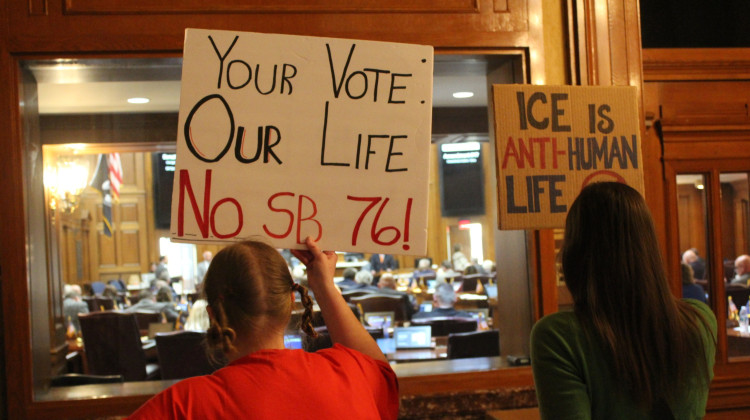Fiscal leaders from the Indiana House and Senate have a tentative deal to reduce corporate income tax rates even further and give counties the option of cutting property taxes on business equipment.
The compromise bill is meant to lure corporations to the state by boosting what is already viewed as one of the nation’s best business climates. The bill could also be the first step in what many Republicans – including Gov. Mike Pence – say is a top priority for the state: Eliminating the personal property tax.
“The folks who are the job creators and determiners of where they’re going to expand and locate are going to be buzzing about this,” said House Speaker Brian Bosma, R-Indianapolis.
Legislative leaders also said Tuesday they are closing in on deals to free up hundreds of millions of dollars for road projects and create a pre-K pilot program.
Bosma said Tuesday that leaders have deals “in principle” on those proposals but nothing yet in writing. By law, those bills must be finished by Friday to make it to Gov. Mike Pence for consideration but leaders said they hope to wrap up their work on Thursday.
Fiscal leaders outlined the business tax deal on Tuesday during a late afternoon conference committee meeting. Business and farming groups used that time to laud the compromise.
Indiana Farm Bureau lobbyist Katrina Hall said the personal property tax is a “disincentive to investment” and told lawmakers the effort to reduce it is important. And Barbara Quandt, state director for the National Federation of Independent Business, said the county option to help smaller firms “is a great start.”
Democrats, though, were critical.
“We don’t believe at this time we can justify asking for another tax reduction when we are showing lower revenues,” said Sen. Karen Tallian, D-Portage, referring to lower-than-projected state tax receipts in recent months.
“We do not believe that this should be the priority for where we are spending our money – and it is a spend when we don’t take in revenue,” she said.
The corporate tax cut would reduce the state rate to 4.9 percent by 2022. Already, the rate is scheduled to drop to 6.5 percent in 2016.
Senate President Pro Tem David Long, R-Fort Wayne, called that provision “very significant.”
“I think cutting the corporate tax to the second lowest in the country will pay dividends for us,” he said.
The property tax proposals would give local officials the option to:
- Eliminate the personal property tax on all new equipment.
- Eliminate the personal property tax for smaller companies with less than $20,000 worth of equipment. If implemented statewide, that could eliminate the tax for about half of all Indiana businesses.
- Approve so-called “super abatements” that free individual companies of paying personal property taxes for as much as 20 years.
The decisions would be made locally by the County Option Income Tax board, which is made up of elected officials from various levels of government. No county would be required to offer any of the tax breaks, all of which could reduce local revenues.
In all, personal property taxes generate more than $1 billion for local governments, schools and libraries. If they were eliminated completely – and other tax laws and rules remained in place – local governments would lose about $600 million. The remaining tax burden would be shifted to other taxpayers.
That’s in part why lawmakers have been reticent to force the changes onto counties.
The compromise bill would also create a commission to study taxes and local government finances and pushes the implementation of most of the cuts until the group finishes its work.
And the proposal creates a tax break for Hoosiers who use propane, which has been especially expensive this winter.
“I think this represents a very strong merger of the ideas that were forwarded by the House and Senate and reflects input from a variety of interest groups,” said Senate Tax Chairman Brandt Hershman, one of the architect’s of the compromise.
“It allows the commission to do its work, but it does put Indiana on a path toward maintaining our leadership role in business taxation.”
Reporter Erika Brock contributed to this report. Lesley Weidenbener is executive editor of TheStatehouseFile.com, a news website powered by Franklin College journalism students.
 DONATE
DONATE








 Support WFYI. We can't do it without you.
Support WFYI. We can't do it without you.